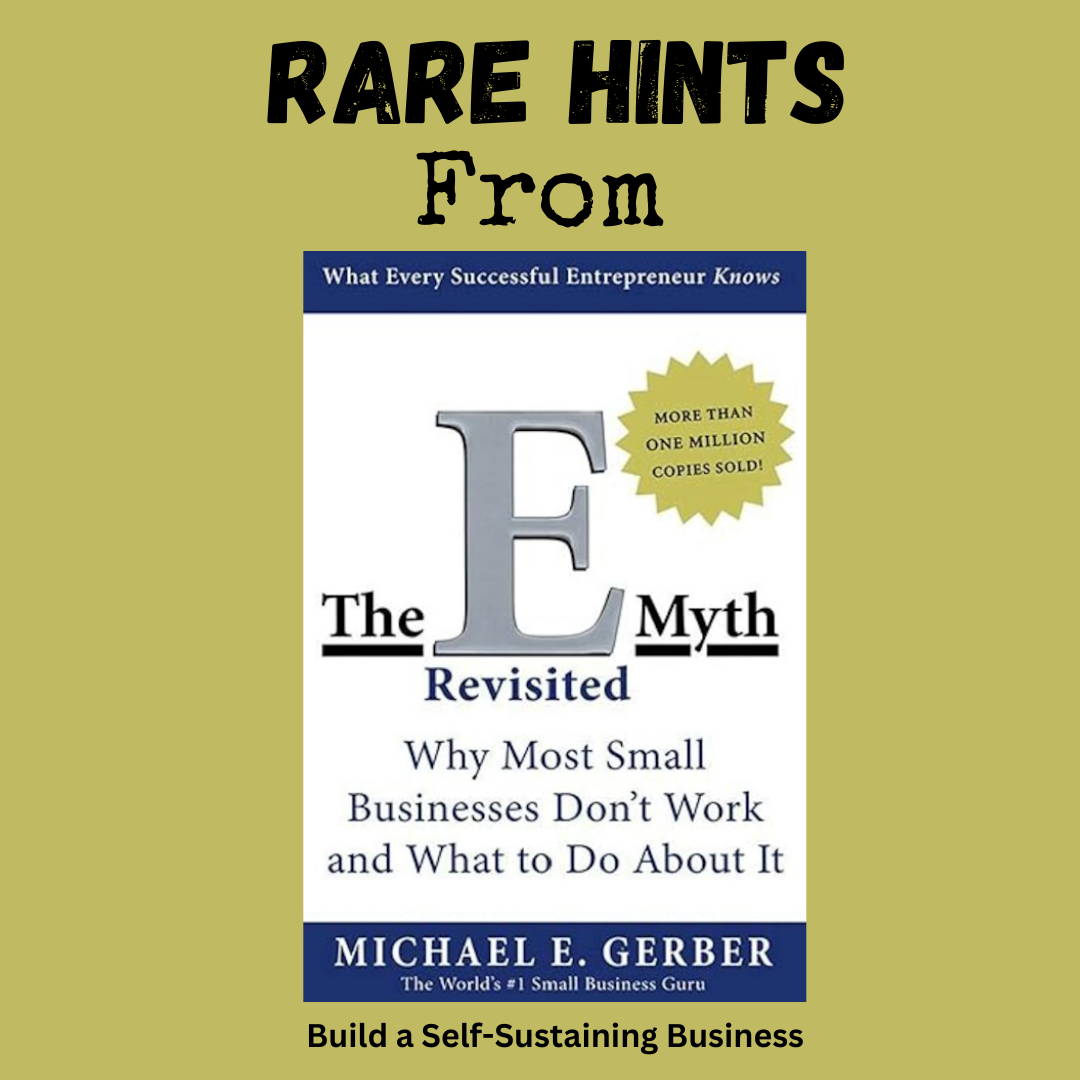Overworked, Underpaid, and Stuck in Your Business? This Might Be Why.
Ever dream of running your own business to achieve financial freedom—only to find yourself drowning in work, stress, and endless to-do lists?
You’re not alone. Most small business owners don’t build businesses—they build jobs.
That’s the brutal truth The E-Myth Revisited by Michael E. Gerber reveals.
Gerber explains why most businesses fail and, more importantly, how to escape the trap of working 24/7 and build a business that works for you.
If you’re tired of trading time for money and want to create a self-sustaining, wealth-building machine, this book holds the key.
🚀 The Big Idea: Work On Your Business, Not Just In It
Most small business owners wear too many hats:
✅ Technician (doing the actual work—baking cakes, designing graphics, coding websites)
✅ Manager (handling day-to-day operations, bookkeeping, and staff issues)
✅ Entrepreneur (big-picture thinking, scaling, and future planning)
“Most people start businesses because they love doing the work—not because they know how to build a business.”
The problem?
🔴 They get stuck in “technician mode”—doing all the work themselves.
🔴 They never create systems—so their business depends entirely on them.
🔴 They can’t scale—because without them, the business falls apart.
Gerber teaches that real success comes when you shift from “employee mindset” to “entrepreneur mindset.”
💡 Why This Matters for Wealth-Building:
- A business that runs without you = true financial freedom.
- Systems create consistency, allowing you to scale without burning out.
- Stepping back lets you work on bigger opportunities—expansion, investing, or even passive income.
🛠️ Key Financial Lessons from The E-Myth Revisited
1️⃣ Stop Being the Technician—Become the Business Owner
Most people start businesses based on their skills—a graphic designer opens a design studio, a baker starts a bakery.
The problem? They focus so much on doing the work that they never build a scalable system to make money without them.
“If your business depends on you, you don’t own a business—you own a job.”
✅ Shift from “doing” to “delegating”—your job is to build a machine, not work inside it.
✅ Create processes so employees can do the work exactly how you would.
✅ Automate and systematize—so things run smoothly even when you step away.
💡 Example: Instead of spending 40 hours a week designing logos, a smart entrepreneur hires a team, creates standard processes, and builds a design agency that works without them.
2️⃣ Think Like a Franchise Owner—Even If You Never Franchise
Gerber emphasizes the franchise prototype—meaning, build your business as if you were going to franchise it.
“McDonald’s isn’t successful because Ray Kroc made great burgers. It’s successful because he built a system anyone could follow.”
✅ Standardize EVERYTHING—from customer service scripts to how tasks are done.
✅ Document your processes so new employees can easily be trained.
✅ Ensure consistent quality—so customers always get the same experience.
💡 Example: If Starbucks employees make the same latte in New York and Tokyo, it’s because they follow the same system. Apply this to your business.
3️⃣ Systems = The Key to Scaling & Wealth Creation
A systemized business:
✅ Runs smoothly without constant micromanagement
✅ Delivers consistent results (which attracts more customers)
✅ Allows you to expand without chaos
“Great businesses aren’t built on great people—they’re built on great systems.”
✅ Automate wherever possible—invoicing, scheduling, emails, marketing.
✅ Use checklists, templates, and guides to create efficiency.
✅ Build repeatable processes—so employees (not just you) can get results.
💡 Example: A cleaning business that documents cleaning checklists, automates bookings, and trains staff on exact processes can expand to multiple cities.
4️⃣ Balance the 3 Business Roles (Entrepreneur, Manager, Technician)
Gerber outlines three crucial roles:
1️⃣ The Technician (The Worker) – The one who does the work.
2️⃣ The Manager (The Organizer) – The one who keeps things running.
3️⃣ The Entrepreneur (The Visionary) – The one who plans for the future.
Most business owners are stuck as Technicians—which is why they burn out.
✅ The goal is to become The Entrepreneur.
✅ Hire or outsource “Technician” tasks (the day-to-day work).
✅ Develop strong management systems—so the business runs itself.
💡 Example: A wedding photographer who trains a team, builds a system for booking clients, and expands into videography services is an Entrepreneur. A wedding photographer who shoots every wedding personally is a Technician.
5️⃣ Adopt a Growth Mindset—Always Be Improving
Gerber emphasizes that your business is a living system—it must evolve.
“The business you build today must be different from the one you run in five years.”
✅ Track your numbers—always know your revenue, profit margins, and expenses.
✅ Continuously refine your processes—look for inefficiencies.
✅ Stay ahead of trends—customer needs change, so your business should too.
💡 Example: A fitness trainer who switches from 1-on-1 coaching to an online subscription model adapts for scalability.
⚠️ Common Pitfalls to Avoid
❌ Trying to do everything yourself. If you’re always working IN the business, you’ll never have time to grow it.
❌ Ignoring processes. If your business lacks systems, it will collapse under growth.
❌ Not thinking long-term. If you can’t step away without the business failing, you don’t have a real business.
❌ Micromanaging instead of delegating. Your goal is to create a team that doesn’t need you every second.
🛠️ How to Apply The E-Myth Revisited to Your Financial Journey
✅ Step 1: Identify Your Weak Spot—Are you stuck as a Technician, Manager, or Entrepreneur?
✅ Step 2: Document Your Processes—Write down repetitive tasks to create systems.
✅ Step 3: Automate & Delegate—Hire help, outsource, or use software to free up your time.
✅ Step 4: Focus on Growth, Not Just Survival—Plan for the long-term, not just daily tasks.
✅ Step 5: Track & Refine—Measure key business metrics and make improvements.
By systemizing your business, you set yourself up for financial freedom and long-term wealth.
🎤 Your Turn!
👉 What’s one business task you can automate or delegate today? Drop a comment below!
🚀 If this helped you, share it with a fellow entrepreneur!





Leave a Comment